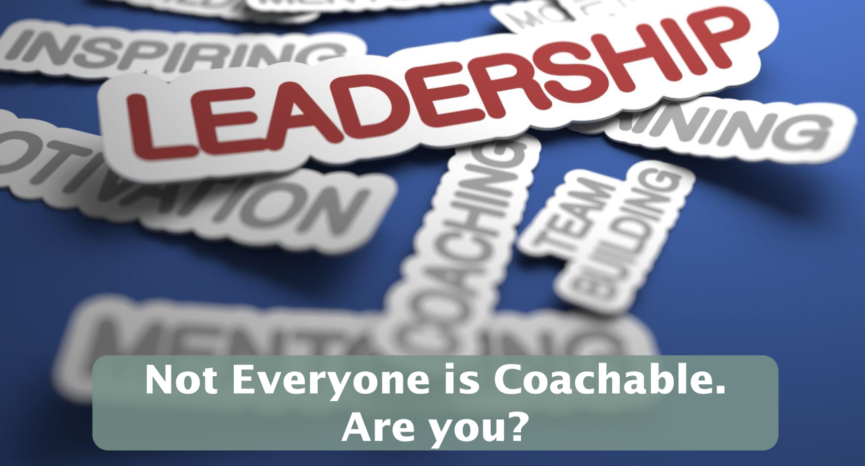Not Everyone is Coachable. Are you?
Recently, two of my colleagues had a podcast conversation on the topic: Is Everyone Coachable?
The short answer is No.
The long answer is a bit more nuanced…
As my colleague Daniel Osborne described it, unfortunately not everyone believes they need to grow and develop.
While he sighed in saying it, based on my observations I would agree.
Thankfully, most leaders recognize that their organizations and the organizational goals require their continued growth and development as a leader. But there are those few leaders who feel that they “have arrived,” that what got them here is all that they need to continue to succeed, that they don’t need to develop further.
These leaders are generally not coachable. Neither by their boss, an external coach, and not even by their board.
Whereas — leaders who want to be even more successful often recognize that, as Marshall Goldsmith wrote, “What got you here, won’t get you there.”
Thankfully, most leaders —
- who set ambitious visions and goals,
- who pursue in earnest the improvement of their organizations, and
- who launch new service offerings to meet customer needs,
are open to their own, continual, personal development — as a leader.
And they are also more coachable, when they find that they cannot go it alone, for what they have set their sights on.
Many leaders recognize that the organizational goals they are pursuing will require personal change of some sort. Whether through honing their strategic thinking skills, enhancing their execution capabilities, or improving on particular leadership behaviors that are currently holding them back from resounding success.
I loved how Brandon Mergard put it recently on a coaching podcast: “You do not think your way into new behaviors. You behave your way into new thinking.”
Marshall Goldsmith developed the principles and practices of Stakeholder-Centered Coaching© by working with top leaders to achieve positive, long-lasting change in behavior for improved leadership effectiveness. The stakeholder-centered coaching approach is systematic, measurable, and pragmatic, with demonstrated results.
As Brandon Mergard elaborated: “There is no growth in the comfort zone. And no comfort in the growth zone.”

Rather, leadership development — specifically with stakeholder-centered coaching — requires the leader to have courage, humility and discipline. In the Coach’s Play Book, Frank Wagner, the late Chris Coffey and Marshall Goldsmith emphasize and elaborate on each of these vital attributes for personal growth.
Coachable Leaders have…
…the Courage to:
- “Honestly look at what behaviors you would benefit from stopping, starting or changing”
- “Communicate to others [stakeholders] what you are working on to improve as a leader”
- Ask others for feedback and feed-forward
…the Humility to:
- “Ask others to ‘help you’ while working on your personal growth as a leader”
- “Show genuine appreciation for feedback and suggestions on your leadership, by saying ‘Thank You’ ”
…the Discipline to:
- “Stick to a monthly routine of following up with others you asked to support you as you develop a new behavior”
- “Spend the needed time to change a behavior that is not comfortable for you”
(Source: Wagner, Coffey, Goldsmith, The Coach’s Play Book, 2021)
As coaches using the Stakeholder-Centered Coaching approach know, not all who wish to develop and grow in their leadership have the Courage, Humility and Discipline to do what it takes.
For some, their beliefs formed from prior successes are a hindrance to future growth.
But thankfully, many leaders recognize that their continued success requires continued growth and are willing to do whatever it takes to succeed.

If you’d like to receive these Inspirations in your inbox every other week, you can subscribe to Kathy’s Excellence Advantage Inspirations Newsletter.
Kathy Letendre, President and Founder of Letendre & Associates, advises organizations and leaders to create their excellence advantage.
Contact Kathy by phone or text at 802-779-4315 or via email.

